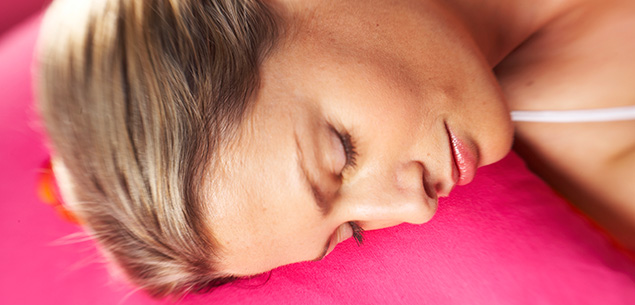One thing we have little control over is the position in which we sleep. Sleep experts say we naturally gravitate to the position in which we feel most comfortable.
However, research shows that in some cases, certain positions can cause or aggravate health conditions. Sleep apnoea, headaches, heartburn and back pain can be associated with the position you end up in while asleep. How you lie in bed can also play a part in developing wrinkles and saggy breasts.
Nearly two-thirds of people (63%) sleep on their sides, with 16% favouring their stomach and 14% preferring to lie on their back.
Lying on your back with your arms by your side
Good for: spine health and for your neck, as long as you don’t use too many pillows and put your neck under strain. This is because it keeps your head, neck and spine in alignment and doesn’t force extra curves into your back. It’s also good for preventing wrinkles because your face is not pressing against a pillow.
Bad for: snorers. It makes snoring worse, and if you are prone to sleep apnoea, you increase your risk of having problems breathing by sleeping on your back.
Lying on your back with your arms above your shoulders (starfish)
Good for: your back and neck and, like sleeping with your arms down, it can help relieve acid reflux because your stomach is lower than your oesophagus, so acid is less likely to flow back up. It also means the weight of your breasts is fully supported, which can reduce sagginess.
Bad for: snoring. Sleeping on your back may also aggravate restless legs syndrome, and having your arms above your shoulders can put pressure on the nerves in your shoulders, leading to pain.
Lying on your front with hands around the pillow
Good for: helping your body to digest food. It can also ease snoring.
Bad for: your neck, which can end up in uncomfortable positions when you turn your head to one side. Sleeping face down can also cause back problems because the curve of the spine is not supported. You’re also likely to notice more wrinkles, thanks to your face being pressed against the pillow.
Sleeping on your side with hands down by your side
Good for: the spine, if you sleep straight rather than hunched over, as it helps to elongate it. It is also better for you than lying on your back if you have sleep apnoea. And it can reduce acid reflux.
Bad for: your skin, which can end up sagging due to the pull of gravity and lying against the pillow. Your breasts can also end up unsupported and become more likely to sag.
Foetal position (on side with knees drawn up)
Good for: easing snoring. Many women also find it comfortable during pregnancy.
Bad for: your back and neck, because you can be very hunched over. And it can be bad for breathing – having your back curved and your chin down can hinder you from breathing deeply. This lack of oxygen can lead to headaches.
Right or left side?
If you lie on the right, you could make heartburn worse. Switching to the left should alleviate that, but it could put strain in your liver, lungs and stomach. Doctors usually advise pregnant women to lie on their left because it can improve circulation to the baby.
How to support your body in bed
If you sleep on your back: put a small pillow under the curve in your back to support your spine, and another one under your knees to decrease stress on your back.
If you sleep on your side: place a pillow between your knees. This stops your top knee and leg sliding forward onto the mattress and rotating your lower spine, which can cause back pain.
If you sleep on your front: put a flat pillow under your hips to keep your spine in better alignment. Don’t use a big fluffy pillow for your head as that can strain your neck. Your pillow should be flat or try not using one at all.
To prevent yourself sleeping on your right: roll up a towel and use it as a wedge behind you so you don’t roll over in the night.
Image credit: Paul Suesse/ bauersyndication.com.au




